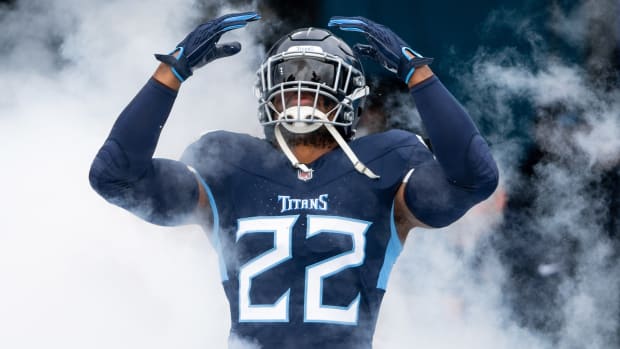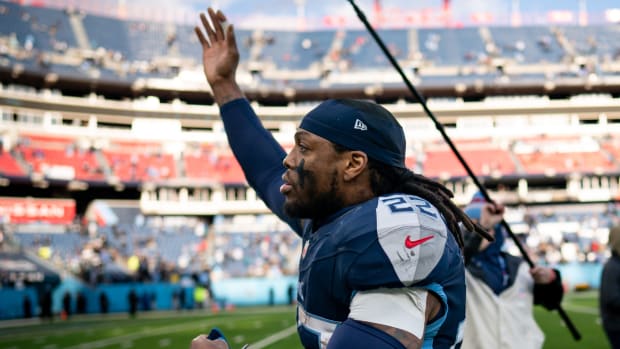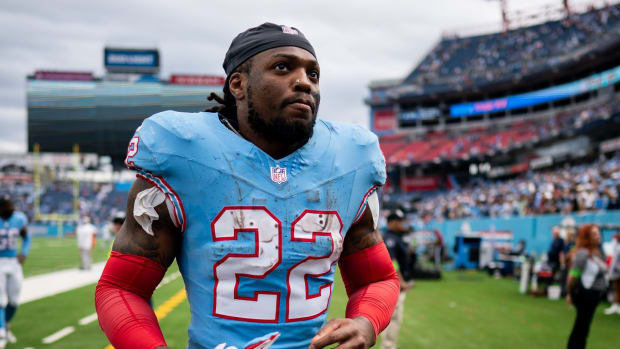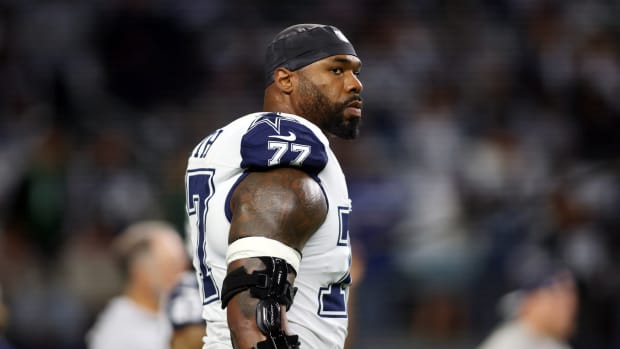Rating the Rookies' Regular-Season Readiness
There were times during training camp when Tennessee Titans safety Kevin Byard – at the request of coach Mike Vrabel – stayed silent in the seconds leading up to practice snaps.
The intent was to push teammates to step up and fill the void.
So, Byard was asked Monday, who stood out when it came to defensive communication, making sure players were lined up properly prior to the snap? His answer was surprising, considering Byard named a rookie.
“I’ve been impressed with Elijah Molden, just being a rookie, coming out and learning the defense a lot,” Byard said. “He’s been doing a good job communicating. You can tell he’s not a guy that you really have to be on a lot as far as talking and stuff like that. He’s been really good for the room.”
With the Titans set to take on the Arizona Cardinals in Sunday’s season opener, Molden appears far and away the most NFL-ready rookie in the Titans’ 2021 draft class.
One reason for that? Almost exclusively a nickel cornerback at the University of Washington, Molden – a third-round pick taken 100th overall – has carried those same skills into his first NFL training camp. He was counted on as a communicator for the Huskies, which has only increased his comfort level in that role with the Titans.
“At Washington, the defense runs through the nickel,” Molden said. “So, I was comfortable communicating. It’s similar here ... I think everything I learned (at Washington) is all foundational toward playing in the NFL.”
But Molden’s readiness goes beyond talking the talk.
In the Titans’ second preseason game -- against Tampa Bay – Molden also showed the ability to get after the quarterback, recording a sack and a pressure during 11 blitzes, per Pro Football Focus. That wasn’t something Molden did as frequently at Washington, as he didn’t post a sack in four seasons there. But an effective blitz from the nickel position would be a big boost for the Titans, who got a combined 8.5 sacks from nickel corner Logan Ryan in 2018 and 2019.
“I always felt like I could (blitz),” Molden said. “It’s something I’m definitely looking to improve on, and we do a good job of coaching it up here. I think it’s just a different way to disrupt the offense, which I’m all about.”
Most importantly, Molden has been good overall in coverage. He has allowed seven completions on nine targets, per PFF, but those catches have resulted in an average gain of just 4.3 yards. Molden didn’t allow a completion of more than nine yards in two preseason contests.
“You can tell he’s had a father (Alex Molden) that played in the league,” Byard said. “You can tell by his savviness, the instincts he plays with.
“We’re going to need him to play a lot of ball for us, big ball for us. So I’m excited to see him and how he’s progressed.”
Based on what he’s shown so far, it appears Molden will be able to contribute right away.
Rookie readiness rating: 8 (on a scale of 1-10).
Here’s a look at how ready the rest of the Titans’ rookie class is to contribute:
Caleb Farley, CB (first round, 22nd overall): It was understood when the Titans picked Farley that he would have more work ahead of him than the average first-round pick. He has great physical tools, but the 6-foot-2, 197-pound Farley missed the offseason and part of training camp due to a pair back surgeries between his last college game and the draft. He also opted out of his 2020 season at Virginia Tech due to COVID-19 concerns, and – just for good measure – he only played two years of cornerback while in college.
Coach Mike Vrabel confirmed Monday what had already been clear, that Farley won’t be a starter in the first game of the season. Because as impressive as his athleticism is, Farley is still working on his playing skills at the position.
“Just because you run fast and have good athleticism – that’s a good start – but you’ve got to play with technique and fundamentals, and understand what offenses are trying to do to you, how they’re trying to attack you,” Titans secondary coach Anthony Midget said. “So that part is just as important as the athleticism for the position, understanding how he’s going to be attacked and the technique and fundamentals to play the position.”
Added Titans general manager Jon Robinson: “It’s understanding leverage. It’s understanding where your help is if you’ve got safety help, or if you’ve got people inside of you, you can push those routes in there to your inside help. It’s learning those things, learning the techniques that we teach.”
Farley’s reps increased in practice and in the preseason games as his health and conditioning improved. There’s no reason to think Farley won’t continue to get better and better as the season progresses, but he’s not there yet.
Rookie readiness rating: 5.
Dillon Radunz, (second round, 53rd overall): It’s been an interesting first training camp and preseason for Radunz. He was chosen as the Titans’ right tackle of the future. But he saw a lot of action at both right guard and right tackle, getting 55 snaps at right guard in the three preseason games and 137 snaps at right tackle, per Pro Football Focus. It seemed like a lot to put on the plate for a rookie, one trying to make the jump from North Dakota State of the Football Championship Subdivision – and one whose college team played just one game last season.
“I think it will benefit him in the future,” offensive line coach Keith Carter said. “But starting out it’s definitely more challenging. He’s done a great job and hasn’t complained a bit. He’s taken a billion reps and he keeps battling through it. So, the rep volume and on top of that the multiple positions is definitely a challenge, but I think he is continuing to make progress and answers the bell and doesn’t complain.”
Radunz won’t be in the starting lineup against the Cardinals. That’s not the end of the world, as the Titans do have some experienced veterans who can fill the role. But there are unanswered questions: How long will it take for him to battle for a starting spot? Is he progressing quickly enough? And how difficult is that transition from a lower-division college to the NFL?
“He’s gotten better with his hands,” Robinson said. “He’s got to learn to continue his length and lean on his technique. That’s the big thing with offensive-line play.
“When you get yourself into a precarious position as an offensive lineman, the defensive linemen in (the NFL) aren’t the ones you played against in college. You can’t get away with just trying to manhandle or maul somebody because you’re bigger and stronger than them. These guys you’re going against are the same size and bigger, if not stronger, than you are. So you’ve got to focus on that technique.”
Rookie readiness rating: 5
Monty Rice, ILB (third round, 92nd overall): Rice didn’t necessarily get a lot of fanfare, but he had a solid preseason, leading the Titans with 13 tackles. He also got a good dose of special-teams work, averaging 13 snaps per game in that category, and that role should carry over into the regular season as well. Barring injury to Rashaan Evans, Jayon Brown or David Long, Rice may not have to produce a lot on defense. But he’s shown so far that he can be a contributor when called upon.
Rookie readiness rating: 6.
Dez Fitzpatrick, WR (fourth round, 109th overall): Fitzpatrick proved to be much more the project than the team had believed when it traded up 17 spots to select him. The 6-foot-2, 208-pound Fitzpatrick looks the part, but appeared to be overwhelmed at times in his first NFL training camp, which is a big reason he became the highest-drafted Robinson pick not to make the initial 53-man roster. He’s now on the practice squad, where he should have ample opportunity to polish his game. Vrabel cited a need for Fitzpatrick to significantly improve his play without the ball in his hands, which included route running and run-blocking. Fitzpatrick played 115 preseason snaps, catching three of four targets for an average gain of 19.3 yards.
Rookie readiness rating: 3.
Rashad Weaver, OLB (fourth round, 135th overall): Weaver got off to a torrid preseason start, when he stuffed the stat line in Atlanta, totaling three tackles, 1.5 sacks, two tackles for loss and a pass defended. He was not as visible in the second and third preseason games, combining for three tackles and a pass defended – while playing 56 snaps against Tampa Bay and 27 against Chicago. Weaver has shown some versatility, moving back and forth between the edge and defensive tackle. He also totaled a combined 10 quarterback pressures during the preseason, per PFF, an encouraging sign since he’ll likely see a fair number of snaps as Bud Dupree returns to full health.
The length of the 6-foot-4, 259-pound Weaver can be a significant asset in rushing the passer. But he understands his height can hurt him at times if he doesn’t use the right technique.
“For me, it’s going to be the same answers for a while on what to work on – just that pad level,” he said. “Being a big guy, it’s easy for me to get up high and look in the backfield, not focus on what’s in front of me. In college, you can do that and get away with it. Out here, you can end up in some bad positions.”
Rookie readiness rating: 6.
Racey McMath, WR (sixth round, 205th overall): McMath’s first few days of training camp were so impressive that teammate A.J. Brown compared him to Julio Jones. That’s right about when things started to go downhill for McMath, whose progress and momentum quickly slowed. He only played in one preseason game – the first – and didn’t catch either of the passes thrown in his direction during 39 snaps. McMath went on the COVID list Aug. 28 and came off Sept. 3. Honestly, though, McMath always seemed like more of an intriguing practice-squad prospect than an immediate contributor. He’d only played in 18 games at LSU and recorded 33 catches.
Rookie readiness rating: 3.
Brady Breeze, S (sixth round, 215th overall): It’s hard to say much about Breeze because we’ve seen so little of him during camp and in the preseason. An ankle injury limited him to seven preseason game snaps – one on defense and six on special teams. He was placed on injured reserve last Friday, meaning he’ll miss at least three games. Throw in the fact that Breeze opted out of his 2020 season at Oregon due to COVID concerns, and it seems unlikely he’ll make much – if any contribution – during the 2021 season.
Rookie readiness rating: 2.




